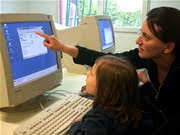
If the internet told you that 2+2=5, would you believe it?
Well, most of us wouldn't fall for that one, but the fact is that the internet and multimedia is playing a huge part in changing and shaping our history, future and cultural heritage.
Today you can find everything on the internet, and I mean everything. I bet that you could probably spend your whole life beside your computer and use the internet and multimedia to do everything for you. You can shop from the internet, pay your bills, order a holiday, talk to your familiy and friends and work from your home etc. So if you wanted to, you would probably never have to leave your house. I think this is an important issue we have to deal with in the future. Or perhaps it's already here?
The internet and multimedia can become a threat to our social lives and to our culture. But the main issue is to find a way to co-exist, because we are both depending on each other.
I came across an interesting video on Youtube with Matt Thompson, an award-winning multimedia producer. And I have to say that he shares some very interesting thoughts with us:
Globalizaton and the new information society - or information age - we are living in, is changing our way to think about our culture and education. Information can be seen as a matierial foundation of the information age. From that point of view, culture can be seen as a constitutive element in the information age insofar as everything is framed and structured by information and communication media. Institutions and people make decisions and represent life through cultural codes and reality is always mediated through language. Culture is important in the information society in two different ways: information capitalism shapes culture with this explosion of the mass communication system, but on the other hand, local cultures have shaped the development and use of information and communication technology.
It is a fact that there is more information available around us than ever. The overflow of information is not only changing our thinking but also our relationship with information. But the relevance of this information seems to become less obvious. It is getting more and more difficult for people to check the relevance of information. What is true and what is false? Sadly, many of us rely blindly on the information they provides from the internet.
So, would you believe that 2+2=5??

.jpg)